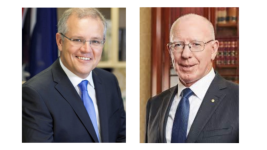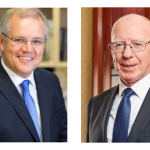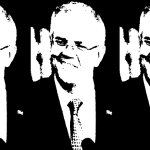Morrison’s Secret Concentration of Power Highlights Flaw in Our Democracy

Although it may not be strictly against the law, it is unsettling to many that former Prime Minister Scott Morrison instructed Governor-General David Hurley (pictured to the right) to appoint him to five ministries, including the powerful positions of Treasury and Home Affairs, without making this known to his own government, let alone to the parliament as a whole or the Australian people.
Concentration of power
The concentration of power resulting from having control of so many portfolios could be seen as coming close to somewhat of a dictatorship; in other words, “a form of government in which one person or a small group possesses absolute power without effective constitutional limitations.”
This is especially the case given that Australia is the only Western ‘democracy’ not to have a national Bill or Charter of Rights, and that our Constitution expressly guarantees only five rights, with a limited freedom of political communication being implied into the document by the High Court of Australia.
The five rights contained in the Australian Constitution are:
- The right to vote (Section 41),
- Protection against acquisition of property on unjust terms (Section 51 (xxxi)),
- The right to a trial by jury for criminal cases in the higher courts (Section 80),
- Freedom of religion (Section 116), and
- Prohibition of discrimination on the basis of State of residency (Section 117).
Not illegal, but secretive to the point of dishonesty
Appointing himself secretly to the five ministries is certainly now, in hindsight, perceived to be dishonest, irrespective of the rhetoric around ‘difficult decisions’ in ‘unprecedented pandemic times’ because although Mr Morrison was sworn in by Governor General David Hurley, many of the PM’s most ‘trusted colleagues’ knew nothing about it.
It’s chilling to think that it’s even possible this was able to occur.
Was it legal for Morrison to hold ‘secret’ ministries?
Was it legal for the former Prime Minister to do this? And what are the implications for decisions that were made during this time?
We’re yet to find out as new Prime Minister Anthony Albanese faces pressure to release the advice he has received around the issue.
What we do know is that in addition to his appointment as the head of the Department of Prime Minister and Cabinet, Mr Morrison was appointed to administer the Department of Health on 14 March 2020, and the Department of Finance on 30 March 2020.
On 15 April 2021, Scott Morrison was appointed to administer the Department of Industry, Science, Energy and Resources; then on 6 May 2021, Morrison was appointed to run the Department of Home Affairs and the Department of Treasury.
The entire issue now raises the question of whether Mr Morrison engaged in misconduct.
Are there consequences for Mr Morrison?
Certainly, as many have pointed out, having been sworn in as minister of five portfolios in secret, definitely undermines the healthy functions of a democratic government.
Despite this, it’s still not clear whether or not there are any real consequences that Morrison will face, except perhaps, remaining the butt of social media jokes and memes.
For the moment, the former PM seems to be behaving like the whole issue is nothing more than a ‘storm in a teacup’ (which, as we’re well aware by now, tends to be his ‘style’ – it’s not the first time he has totally deflected and side-stepped responsibility or failed to be completely transparent).
One issue that’s come to light in recent days is that Morrison was secretly finance minister while Christine Holgate was subject to an “independent” inquiry by the department.
Most know the story – Ms Holgate was, in the eyes of many, badgered and bullied by Scott Morrison during a session of Parliament after she made a decision to gift four senior managers Cartier watches valued at $20,000, calling the expenditure ‘disgraceful’ during parliamentary question time and urged her to step down.
At the time, he effectively destroyed the reputation of one of Australia’s most capable businesswomen, and yet the spending was well within Ms Holgate’s signing authority, signed off by the previous Chairman, and signed off by both the Chief Financial Officer and the company’s auditors. The subsequent ‘Maddocks Review’ into the spending – a review set up and insisted upon by the Morrison Government, also determined that the expenditure was legal.
The rest, as they say, is history.
Fixing the loophole that allows disproportionate power
However, it only exemplifies the depth and significance of the issues here and how difficult it will be to determine if conflict of interest was at play.
While Anthony Albanese has been heavily criticised by the media this week for keeping the focus on Scott Morrison, he is in fact doing Australia a great service by doing so.
This is not about a man trying to take a final swipe at his once-rival, it’s about taking a critical stand for transparency and democracy. The Albanese Government is exploring a number of options in terms of whether to hold an inquiry. The Prime Minister is also currently seeking further legal advice about the ministerial arrangements and this will be made public in the coming days.
What’s more important though, is that something is urgently done to fix the loophole that allows one person such an extraordinary set of powers, in any circumstances.
And certainly Governor General Hurley’s role and authority needs to be reviewed too – the Governor General’s position is considered by many as the last defence to protect Australians from disproportionate power.







